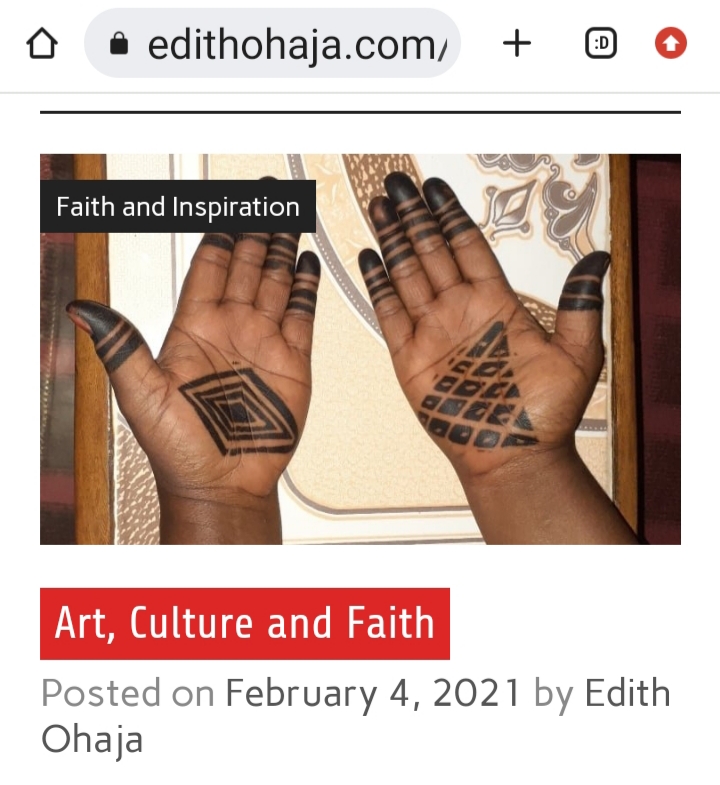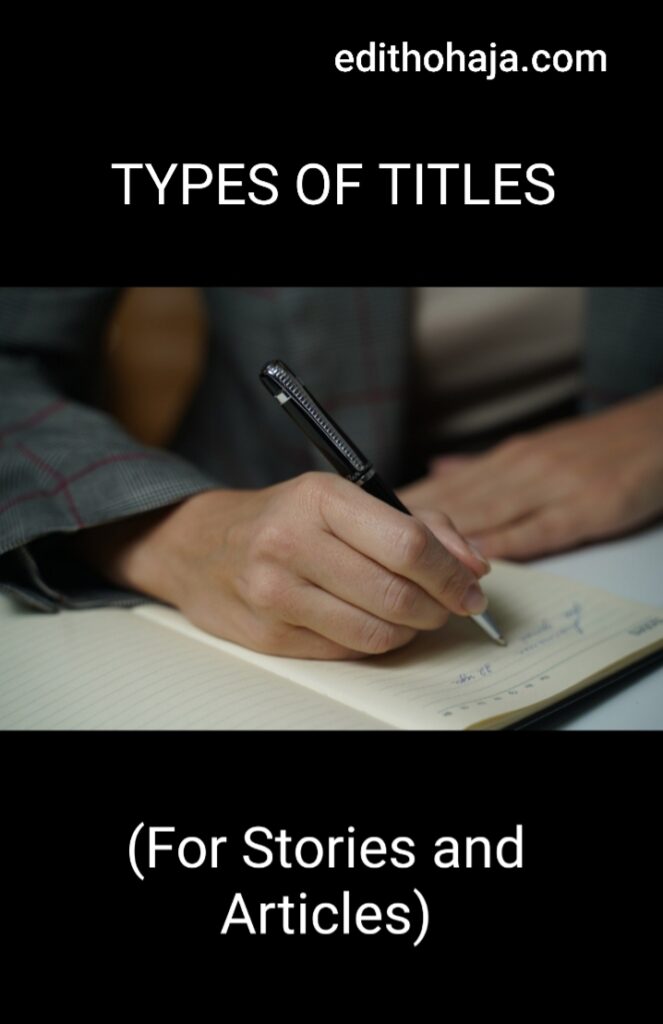TYPES OF TITLES (For Stories and Articles)
Introduction:
Titles of articles, or headlines as they are called in news media, come in different forms. Ability to choose from the various types prevents monotony and improves the chances of your writing getting noticed. This post presents, with illustrations, various kinds of story/article titles for you to work with.
Today’s post is a follow-up on the last one that explained how to write excellent titles. Do read it if you haven’t done so. And after reading today’s post, check out an earlier one on different story beginnings, referred to as leads in the news media. Learning about them will enable you build on the momentum you gain from composing excellent titles.
Different Types of Titles
Although efforts have been made to categorise the titles below for easy understanding, in reality, two or more types can overlap in the same title. What matters is not to compose titles according to their classification but to craft titles that capture readers’ interest.
***Label Title: This is a title that merely helps to identify the story. It neither summarises nor gives its stand on the issue the story or article is about. It is the kind of title books and films often have. Label titles are usually very short and may not draw much attention to the story. Their use is, therefore, discouraged when writing news-related articles. However, they can be used by established writers whose names already draw readers without effort. They can also be accompanied with arresting graphics to pull in readers. Furthermore, a kicker or a rider can be added to provide further explanation.
Examples:
Art, Culture and Faith
(For an article on the interplay between these three concepts in practical terms and how different people handle it. The thrust of the article – whether getting body artwork is sinful – is only revealed on the feature graphic.)

Five Marks
(For a short story about academics and emotional ties. Only the graphic adds the rider that clarifies the title: “When work ethics and relationships collide.)
***Summary Title: This kind of title gives the story in a nutshell. It gives the reader what the article is about right away.
Examples:
Raymond Dokpesi Is Dead
(For an obituary on the late politician/businessman)
For SMEs: Where To Get Low-Interest Loans
(For a piece on available sources of credit for small and medium scale businesses)
***Literary Allusion Title: This is a title that draws from well-known people and events in history and literature. A good knowledge of the reference made is essential to using this type of title successfully.
Examples:
“Why Can’t You Be Like Peter Obi?”
(For a short story that alludes to the legendary prudence of the presidential candidate of the Labour Party in Nigeria’s 2023 presidential elections, who is also the inspirer of the Obidient movement pushing for good governance in Nigeria)
End of the Year Prayer: May Our Troubles Perish Like Pharaoh’s Army
(The allusion in this devotional is to the drowning of the Egyptian army while pursuing Israelis as recorded in the Bible book of Exodus. Note the simile at play too.)
***Question Title: This type is in the interrogative form to spark curiosity in readers. Question titles work best with controversial issues where there are bound to be diverse viewpoints. They can move those who felt uninvolved to think deeply about the issues raised.
Examples:
Should Christians Listen to Secular Music? (4 Things to Consider)
(For an article discussing the pros and cons of secular music for Christians)

What Exactly Did Atiku Discover about Tinubu’s CSU Certificate?
(For a story that tries to fact-check the discrepancies in reports on the outcome of Atiku Abubakar’s court case in Chicago aimed at scrutinising the certificate Bola Tinubu tendered to the Independent National Electoral Commission (INEC) in the last presidential elections.
INEC declared Tinubu of the All Progressives Congress (APC) winner but Atiku who ran on People’s Democratic Party ticket is seeking leave of Nigeria’s Supreme Court to disqualify him on the grounds that the certificate, which Tinubu claimed to have obtained from the Chicago State University, is not authentic.)
Where in the World Is Melania Trump?
(For a story in a tabloid about the former US First Lady who has been noticeably absent from public life this year)
***Contrast Title: A contrast title basically shows the differences between phenomena. It can shine the light on opposing features of one person or group and another, the past and the present or one place and another. It can focus on differing lifestyles, habits, accomplishments and what have you.
Examples:
From Ladies’ Man to Man of God: Joel Ugwuoke
(For the conversion story of a young man who later became a gospel minister)
Celebrating the Dead, Ignoring the Living – A Strictly Nigerian Fetish?
(For an article on the much ado about the dead who never got any attention while they were alive, to explore if it’s a universal or solely Nigerian thing)
***Epigram Title: This involves the use of proverbs and other witty sayings that are relevant to the story. The epigram can be used in its original form if it’s crisp or it can be condensed. It can also be slightly modified for effect or freshness.
Examples:
Gov. Alex Otti: New Broom That Sweeps Clean
(For a story on the reforms embarked upon by the Abia State Governor, Alex Otti, since his inauguration on May 29, 2023.
Spare the Rod … (Need for Tougher Punishment in Schools?)
(For a story on indiscipline in schools with the Biblical proverb, “Spare the rod and spoil the child,” abridged in the title)
***Quotation Title: This type picks a profound or striking statement made by a well-known person or someone in the story for the title.
Examples:
Response to Pastor Kumuyi’s “Do Not Attack Leaders” Sermon
(For a commentary on the esteemed preacher’s admonition to Nigerians to refrain from opposing elected politicians and clergymen)
“Don’t Envy Anyone, Your Miracle Is Coming” (My Job Testimony)
(For an encouraging story on God’s faithfulness that quotes the testifier in the title)
***Figurative Title: This is a kind of title that applies a figure of speech. You can use a metaphor, pun, metonym and so on.
Examples:
Faith and Fame Can Be Friends: John Grisham’s Life
(A story about John Grisham’s phenomenal career as a novelist and his faith that applies the figure of speech, alliteration, in its title)

Once again, Aso Rock Denies Rumours of President’s Ill Health
(Aso Rock is a metonym for Nigeria’s presidency as the White House is for America’s. Such denials as the story features have become a refrain since the tenure of Umaru Yar’Adua with a brief break during Goodluck Jonathan’s time in office between 2010 to 2015.)
***Shocking Title: This type of title captures something unexpected and unbelievable.
Examples:
Imo Gov’ship Election Petition: Supreme Court Rules in Favour of Uzodinma
(Hope Uzodinma came fourth in the governorship race but in an astonishing turn of events, the Supreme Court returned him as governor)
Help! My Wife Is a Guy!
(For a humorous short story)
***Direct Address Title: This form of title speaks to readers directly to elicit greater involvement in the story. The use of the second person case, “You,” is central to the framing of this type of title.
Examples:
Hello, Mature Ladies! Would You Marry A Younger Man?
(For an article that explores how female folk view age differences in marriage, particularly the older women)
Grow Your Wings Before You Fly
(For a motivational piece on the need for self-development before launching a career or venture)

Idiomatic Title: This refers to the use of an idiom in a title. The content of the idiom elicits deeper thought on what the article is about.
Examples:
Don’t Be a Square Peg in a Round Hole
(For a piece on choosing what you are best suited for in life based on your nature/gifts)
Do You See God as Your Lord or Your Fairy Godmother?
(For a devotional addressing Christians who see their relationship with God solely in terms of blessings and not obedience or service)
Conclusion:
This post has explained and provided examples of different types of titles. You can attempt to coin some of these types of titles to help you grow your ability to write arresting headings for your stories.
Remember to read the post on different ways to start an article after this and send me your impression/questions in Comments below and via my Facebook page, Aunty Edith.
Reference
Ohaja, E. U. (2005). Feature Writing Simplified. Enugu, Nigeria: EL ‘DEMAK.


Thank you ma.
For making out time to write this, I must confess that this write-up is really educative and also relevant in our course
study. Happy new month ma, in this new month may the Almighty God bless and keep you. Amen
God bless you too!
Thank you ma’am for taking your time, to bring out all this different types of title. I appreciate ..
Thank you so much ma for this. Now I know the different types of title’s.
Thank you ma, I appreciate your effort. Even though I’m not a mass communication student, it’s still helpful.
I learnt a lot ma, thank you for this great piece